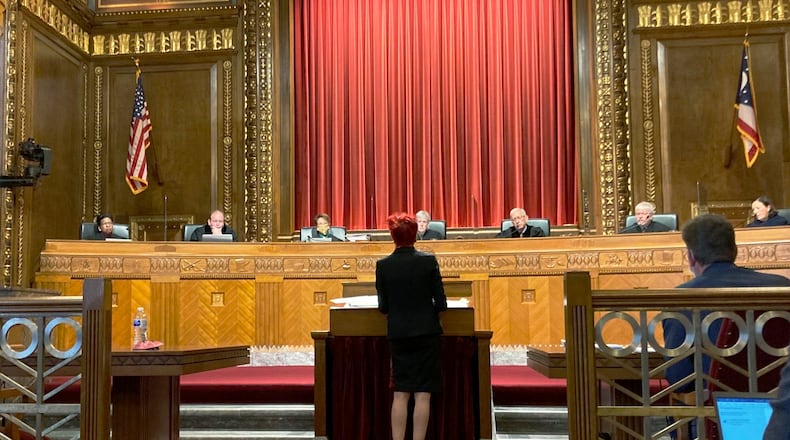The one absence from Thursday’s filings was Ohio Auditor Keith Faber, who broke party ranks to join Democrats in opposing the Feb. 24 redistricting plan. He said then that the Republican plan had the same flaws as the Democratic plan he previously opposed.
The commission’s Democratic members, House Minority Leader Allison Russo, D-Upper Arlington, and commission co-chair state Sen. Vernon Sykes, D-Akron, said Republican commissioners have resisted clear guidance from the court’s two previous rulings.
“This marks the third attempt by the Republican commissioners to advance a patently unconstitutional redistricting plan that would enable Republicans to maintain a stranglehold on the Ohio Senate and House of Representatives,” Sykes’ filing begins.
They ask the court to declare a previous Democratic plan constitutional, hold a speedy briefing on other plans, or appoint a “special master” to work publicly with commissioners on a new plan.
Russo and Sykes also ask the court to halt Secretary of State Frank LaRose’s order for county boards of election to prepare for the May 3 primary using the maps Republicans approved Feb. 24.
“The Republican commissioners appear to be weaponizing the primary deadline,” Sykes’ filing says. “They are using an exigency of their own making to impose an unconstitutional plan.”
Democratic commissioners repeat their frequent public statements that they were frozen out of any meaningful discussions and only given Republican proposals a few hours before they were asked to vote on them.
“There was no room for collaboration, edits, public input, or even an extension of time so we could fully understand the plans we were voting on,” Russo’s filing says.
Filings on behalf of Republican commissioners and for the commission as a whole ask justices to uphold the maps they passed Feb. 24.
“At this point, this case boils down to one question: Who has the actual authority to adopt a General Assembly district plan for Ohio — the Ohio Redistricting Commission, or litigants who prefer their own particular map?” says the filing for Senate President Matt Huffman, R-Lima, and commission co-chair House Speaker Bob Cupp, R-Lima.
They say the commission tried its best to abide by state constitutional standards, but opponents “moved the goalposts” on the partisan margin for a district to be considered competitive.
The filing for LaRose, who is also a commission member, says the request for a special master is “absurd and likely unconstitutional.” Challengers to the latest plan really want to draw new maps themselves, ignoring the commission’s legal role, it says.
The latest approved plan is constitutional and complies with the court’s instructions, while Democrats’ proposals were not, asserts the filing for Gov. Mike DeWine. It would be beyond the court’s power to order adoption of a rival set of maps the commission hasn’t even directly considered, it says.
The plan in question is one justices specifically referred to as coming close to what the court sought. Drawn by Jonathan Rodden, those maps would likely produce 56 Republican and 43 Democratic seats in the state House, and 18 Republican and 15 Democratic seats in the state Senate.
Currently Republicans hold 64 of the 99 House seats and 25 of the 33 Senate seats.
The filing for the commission as a whole says the latest approved maps achieve the partisan breakdown justices were looking for, and make seven of the close Democratic-leaning seats safer than in a previous version.
Drawing new state House and Senate district maps in line with 2020 census results has dragged on for months, involving the redistricting commission and the General Assembly, and drawing lawsuits from voting-rights and progressive groups. Two previous Republican proposals passed without Democratic support, and the state Supreme Court overturned both as unfairly favoring Republicans.
On Feb. 7, the Supreme Court ordered the commission to file new state House and Senate district maps by Feb. 17. At a meeting just before that deadline, Republican commissioners unanimously voted down a Democratic map and declared themselves at an impasse.
In response, the court gave until noon Feb. 23 for commissioners to explain why they shouldn’t be held in contempt.
Their explanations did not satisfy the court, which on Feb. 24 ordered all commissioners to attend a March 1 contempt hearing.
Hours later commissioners voted 4-3 to adopt the latest Republican map plan. The court put the contempt hearing on hold and instead asked parties to file any new objections or defenses for this third set of maps.
The most recent approved maps would likely create 54 Republican House seats and 18 Republican Senate seats. But of those, 19 House and seven Senate seats lean Democratic by less than 4%, while no Republican districts are that close, according to the tally mapmakers handed out.
About the Author

